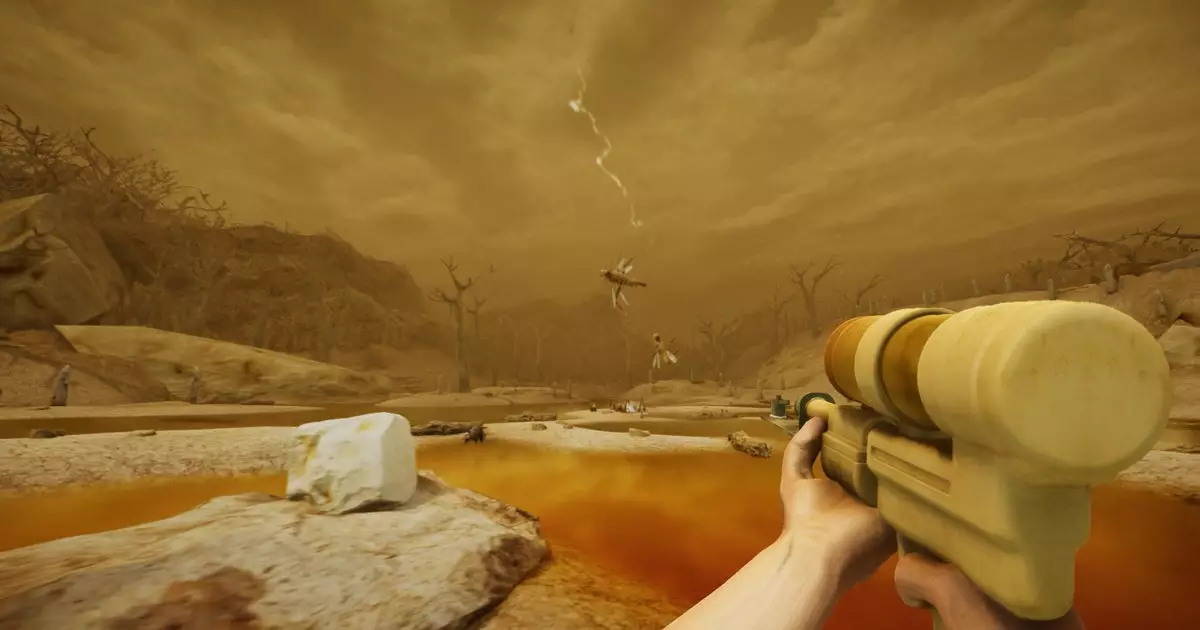In the ever-evolving landscape of video games, creative ideas often emerge that redefine conventional narratives and mechanics. One such instance is the open-world survival shooter titled Urge, which not only challenges norms but does so through an intriguingly revolting premise—the use of urine as a central gameplay element. This article delves into the complex thematic tapestry of Urge and evaluates its innovative approach while addressing the sensationalism that often surrounds such unique designs.
Urge sets itself apart from typical survival games by offering players an environment heavily saturated with a most unconventional resource: urine. The character’s journey begins in a disorienting world following a traumatic car accident, leading them to traverse landscapes enveloped in a miasma that is less atmospheric and more olfactory unpleasant. Here, the ambient fog serves not just as a narrative device but as a gameplay mechanic, symbolizing the consequences of players’ actions in a vividly grotesque manner.
The game’s portrayal of urine—dubbed humorously as “bladdergold” in regions like the West Country or “Crusoe Cola” across the Atlantic—implies a rich lore that extends beyond mere shock value. In this narrative landscape, urine plays multiple roles: as a fuel source for vehicles, a weapon (albeit indirectly), and a biological necessity for survival. Unlike the superficial use of “shock” elements in other games, Urge binds its mechanics to meaningful consequences, urging players to navigate a world where every action dilutes or intensifies the fog that threatens their existence.
As players delve deeper into the lore of Urge, they uncover a world teeming not just with fantastical mutants but also with the dark realities of its industrial past. The game presents a variety of hazards, from yellow-tinged monsters that harass the player to biochemical abnormalities that loom from every corner. Each element of danger is intertwined with the main thesis of the game—that mishandling bladder-derived resources magnifies the chaos of the environment.
The mechanics of waste management add an intriguing twist to traditional survival gameplay. Players are compelled to utilize toilets for the proper disposal of urine, as any wayward drops contribute to the ever-expanding fog and spawn more formidable foes. This aspect cleverly simulates environmental management, using a humorous yet grim metaphor for real-world issues like pollution and climate change. Though the humorous take might come off as juvenile, it offers an unexpected layer of seriousness that can enlighten players about the consequences of negligence.
Critics often dismiss unconventional games as juvenile, particularly when they incorporate taboo subjects like bodily functions. However, Urge seems to transcend such critiques through layered humor and its refusal to take itself too seriously. While the game certainly stirs initial reactions with the mere mention of “piss,” it deftly intertwines lightheartedness with a call for ecological awareness, enabling it to engage players on various levels.
Urge does not merely exist in a vacuum; it can also be seen as a cultural commentary reflective of contemporary environmental crises. By placing players in a setting where they must regularly confront the fallout of their actions—both literally and figuratively—the game prompts reflections on personal responsibility. Through an absurdist lens, Urge navigates serious subjects that often remain unaddressed in mainstream titles, thus attracting a dedicated audience seeking more than just mindless entertainment.
The potential for Urge to develop into a series or comprehensive narrative is substantial, particularly through user-generative content or expanded lore. This uniqueness might serve as a breeding ground for discourse among players and critics alike. Will players ultimately embrace the immersive chaos of this urine-laden universe? Or will the novelty wear thin? Regardless, what remains clear is that Urge dares to challenge the boundaries governing not just survival games, but gaming as a medium itself.
As Urge continues its foray into early access, its distinct philosophy—coupled with the daring premise of urine as a gameplay mechanic—holds promise. The game is an invitation to a wild ride that can potentially captivate audiences who appreciate not just survival, but the art of navigating the absurd complexities of our daily lives. Ultimately, it reminds us that sometimes, the most bizarre experiences can lead to profound reflections on what it means to survive in an increasingly complex world.


Leave a Reply